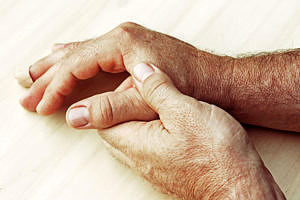DFG funding for basic research on rheumatoid arthritis
Rheumatoid arthritis (RA) is one of the most common chronic inflammatory autoimmune diseases, affecting approximately one percent of the population worldwide. Like other autoimmune diseases, the patients’ immune system mistakenly turns against their own body, attacking bones and joints. Despite considerable advances in treatment, a cure has still not been found. A research group at the Department of Medicine 3 now hopes to gain a deeper understanding of the preliminary phases of RA. The German Research Foundation (DFG) is funding “Pathways triggering autoimmunity and defining onset of early rheumatoid arthritis” (PANDORA) within the framework of a DFG research group. Four million euros has initially been provided for three years. PANDORA will be funded for two three year periods.
Finding the causes
The research group intends to investigate the reasons behind an autoimmune reaction attacking the musculoskeletal system in RA patients. The researchers led by Prof. Dr. Gerhard Krönke (Professor of Translational Immunology) and Dr. Mario Zaiss (Department of Medicine 3) hope to gain a better understanding of the illness in order to identify new approaches for treating patients. One central aspect they will be researching is the modulating influence of natural gut flora as well as various external factors such as diet, alcohol and salt consumption and the affect they have on our immune system, in the hope of discovering what triggers this autoimmune disease.
Searching for a cure
Understanding the illness and how it works at the smallest, in other words molecular or cellular, level should not only allow new, more effective and tailored treatment strategies to be developed, it is hoped that it will even pave the way to finding a cure. Prof. Krönke explains: “Within the framework of PANDORA, we have planned a study in which we will give patients a combination of several therapeutic proteins, known as biological agents, in the hope of being able to reprogramme the patients’ immune system which has turned against their own body. In the future, we hope that we are able to better treat the disease over the long-term.”
Further information
Prof. Dr. Gerhard Krönke
Phone: +49 9131 85 43012
